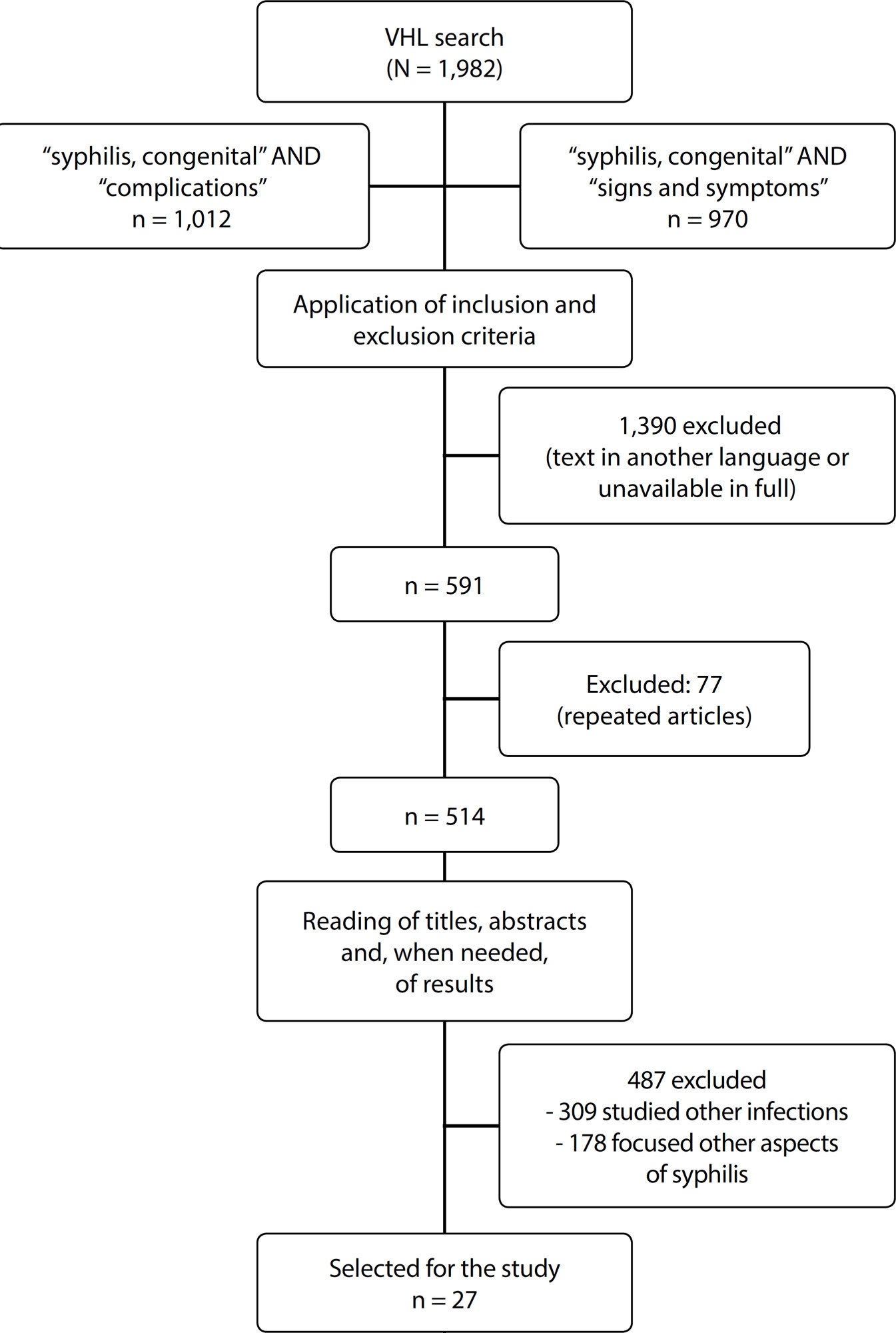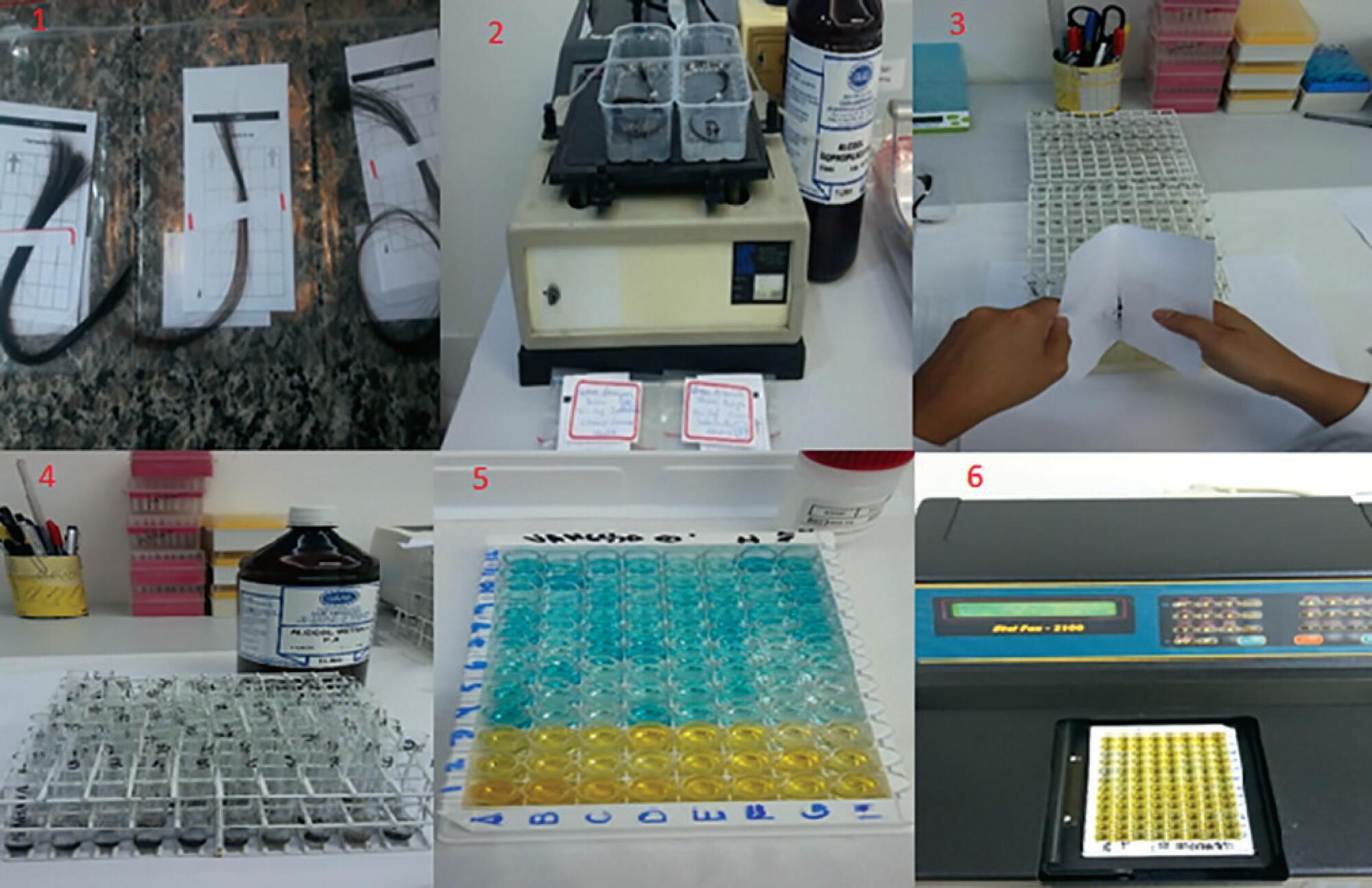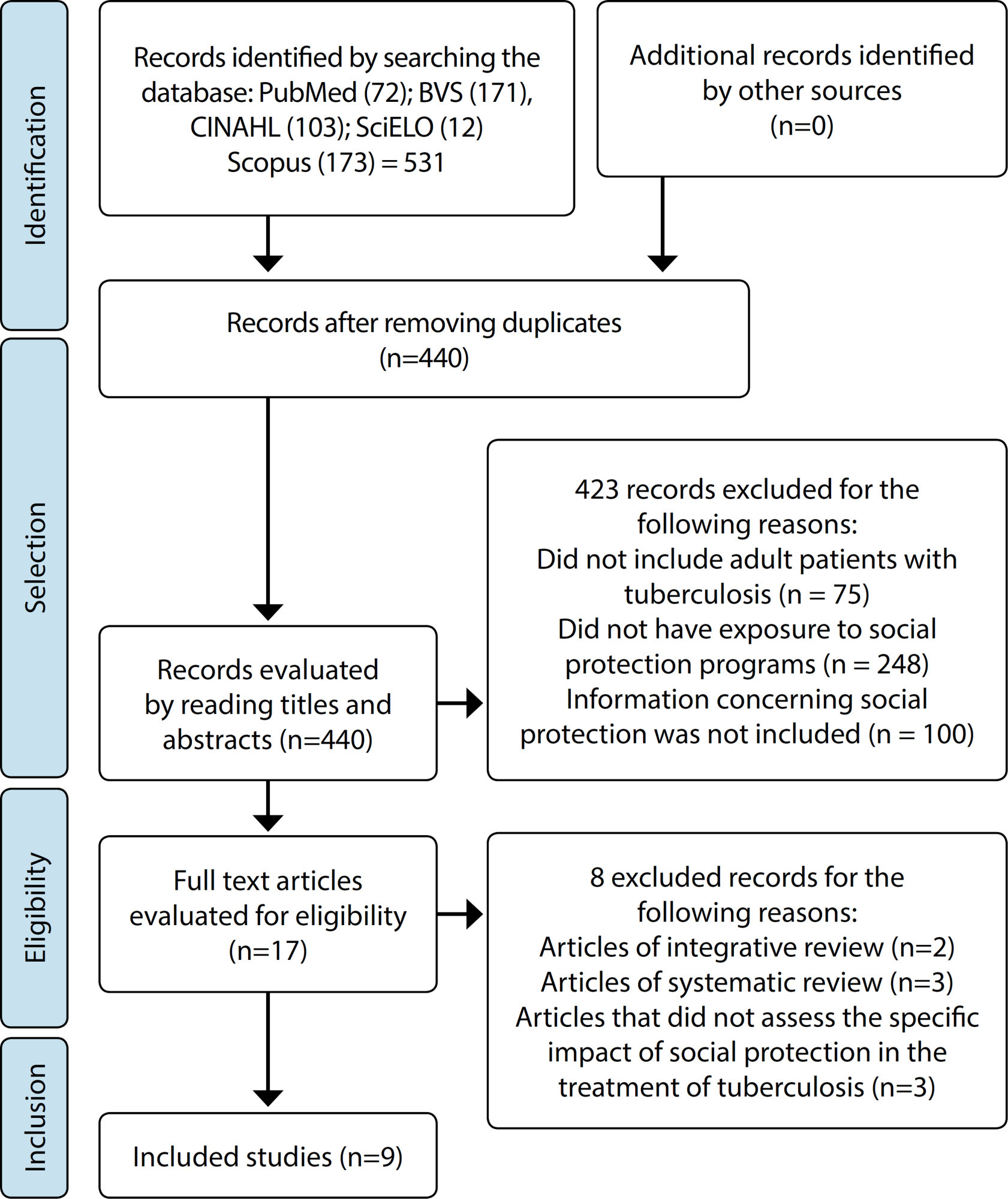-
ERRATUM
ERRATUM
Revista Brasileira de Enfermagem. 2016;69(1):205-205
01-01-2016
Abstract
ERRATUMERRATUM
Revista Brasileira de Enfermagem. 2016;69(1):205-205
01-01-2016DOI 10.1590/0034-7167.20166901e01
Views0In the article “Using the theory of meaningful learning in nursing education”, with the number of DOI: 10.1590/0034-7167.2015680420i, published in the journal Revista Brasileira de Enfermagem, v68(4):626-35, page 627 that read: “Ausubel was descended from Jewish, born in New York in 1918 and died in 1994 at the age of 75. He thought and wrote […]See more -
EXPERIENCE REPORT
Nursing process documentation: rationale and methods of analytical study
Revista Brasileira de Enfermagem. 2016;69(1):197-204
01-01-2016
Abstract
EXPERIENCE REPORTNursing process documentation: rationale and methods of analytical study
Revista Brasileira de Enfermagem. 2016;69(1):197-204
01-01-2016DOI 10.1590/0034-7167.2016690126i
Views0See moreABSTRACT
Objective:
to describe the methods used to analyze the associations between variables of service, nursing and the nursing process documentation in institutions of the Department of Health of the State of São Paulo.
Method:
multilevel analytical study with data obtained in the domains of institution, units of the institution and nursing professionals who work there, using standardized instruments. The analyses had as axis the degree of completeness of the nursing process documentation in units or institutions and their association with variables of nursing personnel, of units and of institutions.
Conclusion:
This study will provide important empirical evidence on the factors involved in the nursing process documentation.
-
EXPERIENCE REPORT
Qualitative methodologies in health research: interpretive referential of Patricia Benner
Revista Brasileira de Enfermagem. 2016;69(1):192-196
01-01-2016
Abstract
EXPERIENCE REPORTQualitative methodologies in health research: interpretive referential of Patricia Benner
Revista Brasileira de Enfermagem. 2016;69(1):192-196
01-01-2016DOI 10.1590/0034-7167.2016690125i
Views0See moreABSTRACT
Objective:
this article reports on the experience of using the interpretive phenomenological framework of Patricia Benner in a Brazilian context. Benner’s interpretive phenomenology, based on existential and interpretative philosophy, aims to understand human experiences in the particular worlds of research participants. Data were collected through interviews with nine nurses in November and December 2014.
Results:
data analysis process according to Benner’s framework consisted of: transcription, coding, thematic analysis, and search for paradigmatic cases and examples. Therefore, the prior knowledge of the researcher is an important part of the study, consisting in manners of the research conduction.
Conclusion:
The use of this methodological framework entailed a great challenge for the researcher, however, it also enabled a unique opportunity to illuminate important existential phenomena related to the daily lives of research participants.
-
REVIEW
Nurses’ performance on primary care in the National Health Service in England
Revista Brasileira de Enfermagem. 2016;69(1):182-191
01-01-2016
Abstract
REVIEWNurses’ performance on primary care in the National Health Service in England
Revista Brasileira de Enfermagem. 2016;69(1):182-191
01-01-2016DOI 10.1590/0034-7167.2016690124i
Views0See moreABSTRACT
Objective:
To analyze the expansion of nursing roles in primary care in the English National Health Service and the implications for professional practice.
Method:
qualitative research in case study format, held in London, England, in six primary care units. Data were obtained through interviews with nine nurses. After the thematic data analysis, two units emerged: the nurses’ performance characteristics and effects of the expansion of nursing roles.
Results:
expansion of nurses’ roles: consultation, diagnosis and drug therapy, case management and monitoring of chronic conditions. Repercussions: for the user, there was improved access, communication and comprehensive care, increased duration of consultations, resulting in greater adherence; for nurses, there was the expansion of professional skills, knowledge and professional recognition; to the health care system, it resulted in cost savings.
Conclusion:
benefits in expanding nursing roles, were visible, contributing to primary care quality.
-
REVIEW
Meleis’ Nursing Theories Evaluation: integrative review
Revista Brasileira de Enfermagem. 2016;69(1):174-181
01-01-2016
Abstract
REVIEWMeleis’ Nursing Theories Evaluation: integrative review
Revista Brasileira de Enfermagem. 2016;69(1):174-181
01-01-2016DOI 10.1590/0034-7167.2016690123i
Views0See moreABSTRACT
Objective:
to analyze the application of the theory evaluation model proposed by Meleis in Brazilian studies.
Method:
integrative review of online articles published from 2002 to 2012 in the databases LILACS and BDENF.
Results:
the 16 selected studies confirmed the use of only three of the five stages proposed for Meleis’ theories analysis: Description of the Theory, Criticism of the Theory and Analysis of the Theory, with a predominance of a single unit of analysis in each.
Conclusion:
the analysis of nursing theories provides support to nurses in the practice, research, education and administration of the different dimensions of care. Meleis’ model figures as very important by contributing to the development of knowledge of nursing discipline, considering that its use as a method allows several reflections on theories in order that they be revalidated to support a more theoretical and practical applicability.

-
REVIEW
Clinical indicators of sexual dysfunction in pregnant women: integrative literature review
Revista Brasileira de Enfermagem. 2016;69(1):165-173
01-01-2016
Abstract
REVIEWClinical indicators of sexual dysfunction in pregnant women: integrative literature review
Revista Brasileira de Enfermagem. 2016;69(1):165-173
01-01-2016DOI 10.1590/0034-7167.2016690122i
Views0ABSTRACT
Objective:
to identify the nursing diagnosis clinical indicators of sexual dysfunction in pregnant women.
Method:
it is an integrative literature review, with research in databases using the keywords “sexual*”, “pregnan*” and “function*”. Studies included had an abstract available for analysis, referring to pregnant women over 18 years old, written in Portuguese, French, Spanish and English, with publication date between 2010 and 2014. Studies that reporting pregnant women with an associated pathology were excluded.
Results:
sexual dysfunction in pregnant women is consistent in the literature. Nine defining characteristics were identified and 16 related factors, some not classified in NANDA International.
Conclusion:
clinical indicators can be added to the nursing diagnosis to favor an accurate diagnosis and effective interventions in the surveillance of pregnancy as a period of healthy sexual experience.
Keywords:Physiological Sexual Dysfunction, Psychogenic Sexual DysfunctionPregnant WomenReviewSexual BehaviorSee more
-
RESEARCH
Conditions of functional health literacy of an elderly diabetics group
Revista Brasileira de Enfermagem. 2016;69(1):156-164
01-01-2016
Abstract
RESEARCHConditions of functional health literacy of an elderly diabetics group
Revista Brasileira de Enfermagem. 2016;69(1):156-164
01-01-2016DOI 10.1590/0034-7167.2016690121i
Views0See moreABSTRACT
Objective:
to evaluate the conditions of functional health literacy of an elderly diabetics group.
Method:
cross-sectional and descriptive study, with diabetic’s elderly assisted in the SUS (N = 114). The social and health conditions were evaluated as well as functional health literacy by S-TOFHLA test (short version); the simple proportions, average, standard deviation and Pearson’s Chi-square were described by SPSS software (20.0) with α = 5% value.
Results:
the mean age was 67.4 years, 74.0% of the elderly were women, had up to four years of schooling; 29.8% had a long-standing illness, 64.0% reported having high blood pressure, 47.4% smoke or were smokers, 73.7% had low functional health literacy, which was associated with schooling p = 0.001.
Conclusions:
the low functional health literacy could be a self-care conditioning and can be influenced by low schooling because it implies to have skills to understand and make decisions aimed at self-management of health.
-
RESEARCH
Profile of patients with brain tumors and the role of nursing care
Revista Brasileira de Enfermagem. 2016;69(1):150-155
01-01-2016
Abstract
RESEARCHProfile of patients with brain tumors and the role of nursing care
Revista Brasileira de Enfermagem. 2016;69(1):150-155
01-01-2016DOI 10.1590/0034-7167.2016690120i
Views0See moreABSTRACT
Objective:
to describe the profile of 200 patients with central nervous system tumors (CNST), and the role of the nursing care.
Method:
prospective, quantitative and descriptive analysis of medical records of 200 patients with TSNC.
Results:
a total of 61% of our patients had benign CNST and 39% had malignant tumors. The extent of patient dependence, according to the Karnofsky Performance Status scale, was significantly greater for patients with malignant CNST (p < .05), indicating that these patients needed more support with their activities of daily living.
Conclusion:
patients with CNST need specialized care, with specific guidance regarding their disease and aspects of daily living after treatment. Thus, the nurse can function as a key element for the effectiveness of care provided to patients and family members with the aim of enhancing the quality of life of all those affected, directly or indirectly, by the disease.
-
REVIEW
Complications, clinical manifestations of congenital syphilis, and aspects related to its prevention: an integrative review
Revista Brasileira de Enfermagem. 2021;74(4):e20190318
07-14-2021
Abstract
REVIEWComplications, clinical manifestations of congenital syphilis, and aspects related to its prevention: an integrative review
Revista Brasileira de Enfermagem. 2021;74(4):e20190318
07-14-2021DOI 10.1590/0034-7167-2019-0318
Views0See moreABSTRACT
Objectives:
to identify the scientific evidence about the clinical complications and manifestations of congenital syphilis and aspects related to its prevention.
Methods:
integrative review after a search in the databases LILACS and MEDLINE, carried out in March 2018, using the descriptors “syphilis, congenital”, “complications”, and “signs and symptoms”, leading to the selection of 27 researches.
Results:
the publications found were published from 1966 to 2017, and most of them were from Latin America and Africa. Negative outcomes, laboratory changes, and the clinical manifestations in congenital syphilis, whether early or delayed, were, respectively: low weight at birth, anemia, hepatosplenomegaly, and dental alterations. The lack of treatment of the pregnant women in the prenatal was the most common occasion in which the opportunity to prevent the complications of congenital syphilis was lost.
Conclusions:
the scientific evidences analyzed showed serious complications of congenital syphilis that could be avoided if early opportunities of diagnosing and treating the pregnant women are not lost during the prenatal.

-
ORIGINAL ARTICLE
Cultural adaptation of Infant Feeding Intentions Scale (IFI) for pregnant women in Brazil
Revista Brasileira de Enfermagem. 2020;73:e20190103
07-15-2020
Abstract
ORIGINAL ARTICLECultural adaptation of Infant Feeding Intentions Scale (IFI) for pregnant women in Brazil
Revista Brasileira de Enfermagem. 2020;73:e20190103
07-15-2020DOI 10.1590/0034-7167-2019-0103
Views0See moreABSTRACT
Objectives:
to translate and culturally adapt the Infant Feeding Intentions Scale for pregnant women in Brazil.
Methods:
methodological study that included stages of translation, synthesis, face and content validation, back translation and semantic assessment. In the face and content and semantic validation stages, we used the Content Validity Index for individual items and for the overall scale for clarity and representativeness.
Results:
nine (100.0%) experts participated in face and content validation, and the average index obtained was 85.0% for representativeness. In the semantic assessment, performed with 31 (100.0%) pregnant women, the tool was considered clear, obtaining an average index of 91.0%.
Conclusions:
the Brazilian version of the scale was considered representative and clear. After assessing psychometric properties, the scale is expected to be valid and reliable to assess maternal intention to breastfeed exclusively until the infant’s six months of life in different Brazilian settings.
-
ORIGINAL ARTICLE
Development, validation and application of clinical simulation scenarios for assessment of stomatherapy specialists
Revista Brasileira de Enfermagem. 2021;74(1):e20200360
03-24-2021
Abstract
ORIGINAL ARTICLEDevelopment, validation and application of clinical simulation scenarios for assessment of stomatherapy specialists
Revista Brasileira de Enfermagem. 2021;74(1):e20200360
03-24-2021DOI 10.1590/0034-7167-2020-0360
Views0ABSTRACT
Objectives:
to build and validate three clinical simulation scenarios and report the application with candidates for the specialist’s degree in stomatherapy.
Methods:
methodological study, building three scenarios and evaluation checklists; content validation with judges, using content validity index and Modified Kappa Coefficient; pre-test and application.
Results:
scenarios built based on nursing care for: 1. insufficiency and venous ulcer; 2. demarcation of intestinal stomia; and 3. Clean intermittent catheterization. In the content validation of the 24 items appreciated, 83%, 80%, and 92% were validated without change. In the pre-test, the objectives and checklists were adjusted. In the application, to standardize the evaluation, actors and evaluators were trained previously, and each candidate passed the three stations.
Conclusions:
scenarios built and with validated content, based on evidence and covering the three areas of stomatherapy. The pre-test allowed for adjustments in the scenarios, and the candidates achieved the expected objectives.
Keywords:Educational AssessmentNursing EducationPatient SimulationSimulation TrainingValidation StudiesSee more -
ORIGINAL ARTICLE
Management of home care by family caregivers to elderly after hospital discharge
Revista Brasileira de Enfermagem. 2020;73:e20200474
12-07-2020
Abstract
ORIGINAL ARTICLEManagement of home care by family caregivers to elderly after hospital discharge
Revista Brasileira de Enfermagem. 2020;73:e20200474
12-07-2020DOI 10.1590/0034-7167-2020-0474
Views0See moreABSTRACT
Objective:
To understand the management of home care by family caregivers of dependent elderly people after hospital discharge.
Methods:
Qualitative research guided by hermeneutics-dialectic, anchored in the theory of communicative action. Data collection took place using a semi-structured interview with 11 participants.
Results:
Two categories were constructed: Management of the many types of care by the caregiver and the relationship between family caregiver and health care network. Care and management actions carried out routinely cause major changes in the family caregiver’s life. He/she does not recognize planning, home care periodicity or support in required procedures.
Final Considerations:
The management of home care for dependent elderly people after hospital discharge is complex, involving physical and emotional overloads, as well as difficulties in getting support from health services. The planning shared between the health team and the family since the discharge is required, and the better visibility of the role of primary care when the patient is assisted by a home care service.
-
Sexuality is associated with the quality of life of the elderly!
Revista Brasileira de Enfermagem. 2021;74:e20201272
07-09-2021
Abstract
Sexuality is associated with the quality of life of the elderly!
Revista Brasileira de Enfermagem. 2021;74:e20201272
07-09-2021DOI 10.1590/0034-7167-2020-1272
Views0See moreABSTRACT
Objective:
to analyze the association between sexuality and quality of life of Brazilian elderly residents in the community.
Methods:
a cross-sectional study conducted with 477 Brazilian elderly. The data were collected between August and October 2020. We used the EVASI and WHOQOL-OLD (World Health Organization Quality of Life). Data analysis was performed with Mann-Whitney, Spearman and Kruskal-Wallis correlation tests, with Bonferroni post-hoc application when necessary, considering a 95% confidence interval.
Results:
there was a statistical association between all dimensions of sexuality and the general quality of life of the elderly (p<0.05).
Conclusion:
the stimulation of sexuality can be configured as an innovative and holistic strategy focused on the promotion of health and active aging, since this study found the association between sexuality and the general quality of life of elderly people.
-
ORIGINAL ARTICLE
Stress and cortisol levels among members of the nursing team
Revista Brasileira de Enfermagem. 2020;73:e20180953
06-01-2020
Abstract
ORIGINAL ARTICLEStress and cortisol levels among members of the nursing team
Revista Brasileira de Enfermagem. 2020;73:e20180953
06-01-2020DOI 10.1590/0034-7167-2018-0953
Views0See moreABSTRACT
Objective:
To analyze the characteristics of hospital nursing professionals with the presence of stress, and to associate this with capillary cortisol.
Method:
A cross-sectional, exploratory and correlational study, conducted in a hospital in São Paulo, Brazil. A total of 164 nursing professionals participated; the Perceived Stress Scale was administered, and hair samples were obtained for laboratory analysis. Data were entered into a Microsoft Excel spreadsheet (2010), and then into Microsoft Office and the R software, version 3.2.2.
Results:
High levels of capillary cortisol in 47% of participants suggest the presence of stress, but no statistical significance between cortisol and stress levels were found.
Conclusions:
Stress and capillary cortisol levels were indicative of stress among nursing professionals; however, no association between them was found, although the values found were above those recommended.

-
ORIGINAL ARTICLE
Functional health literacy in hypertensive elders at primary health care
Revista Brasileira de Enfermagem. 2019;72:266-273
12-05-2019
Abstract
ORIGINAL ARTICLEFunctional health literacy in hypertensive elders at primary health care
Revista Brasileira de Enfermagem. 2019;72:266-273
12-05-2019DOI 10.1590/0034-7167-2018-0897
Views0See moreABSTRACT
Objective:
to assess the relationship between inadequate functional health literacy and inadequate blood pressure control in older people with hypertension in Primary Health Care.
Method:
a cross-sectional study with sample calculated at 392. SAHLPA-18 tool was used for functional health literacy; blood pressure was measured; sociodemographic and clinical data were collected. Hierarchical logistic regression was used.
Results:
(high) inadequate blood pressure and (low) functional inadequate health literacy were present in 41.6% and 54.6% of the people, respectively. Factors associated with inadequate blood pressure were: inadequate functional health literacy, black-brown skin color, overweight-obesity, hypertension diagnosis time, non-adherence to exercise/diet, drug treatment. Schooling had no association with inadequate blood pressure
Conclusion:
hypertensive elderly people with inadequate health literacy were more likely to have inadequate blood pressure. Thus, health professionals need to value functional health literacy as a possible component to control blood pressure.
Search
Search in:
Nuvem de Tags
Aged (144) Atenção Primária à Saúde (239) COVID-19 (104) Cuidados de Enfermagem (269) Educação em Enfermagem (151) Educação em Saúde (139) Enfermagem (930) Estudos de Validação (131) Health Education (144) Idoso (208) Mental Health (149) Nursing (987) Nursing Care (306) Patient Safety (151) Primary Health Care (284) Qualidade de Vida (104) Quality of Life (106) Saúde Mental (145) Segurança do Paciente (150) Validation Studies (108)




